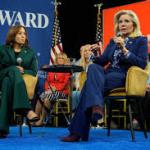I’ve got a bonnet full of bees today. Here’s one.
Which Catholic job would I least want to have? Head of the Vatican Bank? President of the LCWR? Negotiator with the SSPX? Butler to His Holiness? Nope. Any of those would be easy peasey lemon squeezee, compared to the Most Thankless Job in Christendom:
Catholic Bishop.
Any bishop, anywhere, any day. And I say that with full disclosure of my secret ambition, egged on by my friends Michael and Brian, to be named, against all odds and for obvious reasons in petto, Titular Bishop of Puppi. (No disrespect meant to the current holder of that distinction, ex petto, the Most Rev Montfort Stima, an auxiliary of Blantyre, Malawi; the choice was purely because we get a 10-year-old boy snickering thrill out of saying “Titular Bishop of Puppi in petto.”)
Of all the no-one-expects-the-Spanish-Inquisition surprises that continue to accompany my revertigo, this is the surprise-iest, this surge of sympathy for the Church’s management corps. But really, talk about your no-win position. I’m not just talking about the usual perils of the episcopate, like the tendency of Chinese bishops to disappear. And I don’t mean the sort of generic political dismissiveness leveled against the USCCB, as in “the bishops, those socialist Obama bootlickers” or “the bishops, those tools of the right wing’s war on women and the poor.”
No, I’m talking about the way we leap at the throats of individual bishops, in public and without a second’s thought. From the left, from the right, from the pulpit, from the pews, from CNN to HHS, it’s always His Fault. And it doesn’t matter if he’s a lowly auxiliary in Malawi or an exalted cardinal in the halls of Vatican power, he’s damned if he does, damned if he doesn’t. And there’s a kneejerk swiftness, fueled by Internet speeds, about the way we rush to judgment.
I don’t hold myself apart. I’ve been a damner, surely will be again. But it seems to me the rhetoric has ratcheted up to whole new levels of vilification and calumny since the 60s, when bishops tended to fall under the whole category of don’t trust anyone with a Ring of Power. There was another difference between then and now. We may not have agreed with bishops, but we recognized their role. We had respect for the office if not for the man, as the old saying goes about presidents.
Not so anymore. I can’t count the times, even in the last week, let alone in the two years since my return, when I’ve seen people defy a bishop’s authority and cite a theologian (“Where there is a proximate danger to the faith, prelates must be rebuked, even publicly, by their subjects” ~ Thomas Aquinas) or a saint (“The road to hell is paved with the skulls of bishops” ~ attributed, without documentation, to St John Chrysostom) or an unauthorized appearance of Mary (“Many cardinals, many bishops and many priests are on the road to perdition and taking many souls with them” ~ The Second Warning of Garabandal) for backup.
That public rebuking thing? Nobody seems to need Thomas egging them on these days. Fans of the erstwhile Fr Corapi and supporters of the well-known Fr Pavone didn’t hesitate to criticize their ordinaries for exercising due diligence. Both Bishop Mulvey of Corpus Christi and Bishop Zurek of Amarillo were called out as running dogs of the Obama administration and minions of Satan for “suppressing” conservative priests. Bishop Braxton of Belleville is getting it from the left today with equal vitriol for suspending the faculties of 72-year-old Fr William Rowe, a pastor who refused to desist from ad libbing the liturgical texts to better suit the message he wanted to communicate and sustained that obstinacy over several decades and through at least two long-suffering ordinaries. (Poor Bishop Braxton. I knew him when he was a catechetical consultant for Sadlier—see, I didn’t bring down catechetics all by myself!—and he was too liberal for a lot of Catholics then. They ought to issue whiplash collars with the pectoral cross.)
The rule seems to be: If I disagree with a bishop, I’m right. In fact, it may even be my duty to disagree, and to tell everybody else how wrong the bishop is. The height of this kind of thing was reached this week when a traditional Catholic blog ran an interview with the newly named head of the Congregation of the Doctrine of the Faith, Archbishop Gerhard Ludwig Muller, and inserted editorial comments (italics mine) mocking and correcting him every few lines. (h/t to Deacon Greg Kandra)
You have been declared, in respect of such words, to be among the liberals. Did that surprise you?
Oh well. Saint Thomas Aquinas says, “Deus maxime liberalis est – God is the Greatest Liberal”. (Cathcon- normally translated as “God therefore is in the highest degree liberal” to ensure that there is no conflation of the ideas of liberality with the practice of liberalism in any sense). In the original sense liberalis is liberally and generously. ” In this sense, I love being a liberal. (Cathcon- one waits for years for the Head of the CDF to quote St Thomas and he is now used in such a poor way)
You have always been very critical of the SSPX. Now, you are responsible as Prefect for the return of the fallen-away Society into the bosom of the Church. How difficult is it?
The negotiations of the Vatican with the SSPX brothers are friendly, Christian and humane, but clearly in formation. Who wants to become Catholic again must recognise the authority of the Pope and the bishops (Cathcon- the SSPX certainly think they both are Catholic and recognise the authority of the Pope. Big misunderstanding from Mueller which is at variance with various Vatican statements of recent years).
Besides the usual arguing, conspiracy theories, and accusations of egotism and power tripping, the anti-bishop chatter can get downright ugly. Bishop Zurek was accused of locking Fr Pavone in a snake-infested shed and flying down to Rio for, you know, the Kind of Things People Do When They Go on Vacation to Rio, nudge wink. When Cardinal Wuerl stepped into the contretemps between a lesbian denied communion at her mother’s funeral and the priest who did the denying (himself a right-wing think tank director incardinated in Moscow), Catholic bloggers called the Cardinal “Wuerl the Girl,” and shrugged Well, what would you expect? The same sort of fourth-grade playground nonsense was tossed the way of Cardinal Christoph Schonborn when he overruled a pastor’s decision to ban a gay man from an elected position on a parish council.
Cardinal Schonborn, to his credit, took a swing back. In an interview with Our Sunday Visitor, he asked that those who would judge him give him the benefit of the doubt, recognizing that Everybody Isn’t Privy to Everything, and Bishops Aren’t Always Arbitrarily Idiotic:
Our Sunday Visitor: Recently in your diocese, a young openly homosexual man was elected to his parish council. Both his election and your decision to allow his election to stand created quite a stir in the media. Could you explain your thinking on that decision and the controversy surrounding it?
Cardinal Schönborn: To begin with, I believe this was a very local situation that certainly did not deserve to be discussed in public, mainly because it is out of the question that the concrete details of the situation be exposed to the public. The only thing I’ve requested of people is that if I make a pastoral decision in a very concrete circumstance they should trust that this decision does not reflect any change in my commitment to Catholic teaching.
The fact is that sometimes we have to live with situations that are objectively disordered, but we do so with the hope that the people are on the way of faith. We are a community of sinners who all need to improve our lives. We all have to take steps to be more completely conformed to the Lord’s teachings. In this particular situation, I have certainty that the young man is on the way of the Christian life and is conforming his life more and more to God’s plan. I was clear with him about the Church’s teaching when I spoke, but we need to have patience. Again, the only thing I request is to trust that I did not make this decision lightly or arbitrarily, and am in no way denying the Church’s teaching on this issue.
(Cardinal Schonborn’s plea that we have patience with those on the way to full conversion of life addresses yet another of my bonnet bees—our refusal to allow for pastoral baby steps—but that’s another post.)
I know that there are many who will say—who do say, every day, in blog posts and comboxes and on Facebook pages everywhere—that no Catholic bishop retains a shred of moral authority in the wake of the egregious abuse of that authority perpetrated by some. The abuse scandal and its eternal repercussions show us the face of evil, even the banal evil of administrative incompetence. That’s true. But it’s strawdoggery of the worst sort to use that to justify every petty insult or refusal of obedience. The fact that some bishops sinned—today, in the past, in years to come—does not give you the right to line the road to hell with the skulls of all bishops, twist ye Chrysostom’s words how ye will.
So. I’m not going to go so far as to become a charter member of the Society for the Prevention of Cruelty to Bishops. I just want you to think. The next time you’re tempted to say about a bishop Jesus wouldn’t have done it that way, bite your tongue or your typing fingers. It’s possible Jesus wouldn’t have done it that way. It’s even remotely possible that the whole apostolic succession was Jesus’ way of getting back at the Apostles for being so collectively thick: condemn their successors, in perpetuity, to being told how much like Jesus they weren’t. It’s even more possible, though, that you and I and the bishops don’t have a fracking clue how Jesus would have done it, but bishops have the unenviable job of having to go ahead and do it anyway.
Agree or disagree with him, take a minute right now to pray for your bishop—for all bishops, present and disappeared.
If you’re on speaking terms (as in minimally cordial small talk, not poo-flinging invective) with a bishop, scare the heck out of him by saying thank you.
And if you are able and it’s appropriate, buy your bishop a drink. On me, and the bees in my bonnet.
_____
Related: Elizabeth Scalia says a wee and angry word of thanks to bishops on behalf of women.















